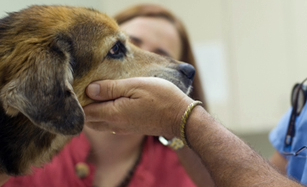
Dog Heartworm: Identify, Understand and Treat
Heartworm disease is a severe and potentially life-threatening condition that affects dogs worldwide. Understanding the causes, symptoms, treatments, and the importance of heartworm prevention is crucial for every pet parent to ensure their furry friends lead a happy and healthy life. Read on to understand how heartworm infestation is contracted to symptoms, treatments, and the significance of effective prevention methods for dogs.
What is Heartworm Disease?
Heartworm disease is caused by a parasitic worm called Dirofilaria immitis, commonly known as heartworm. These worms can grow up to 12 inches in length and reside in a dog's heart, lungs, and blood vessels. The infestation can lead to blockages, compromised blood flow, heart failure, and stress on the kidneys and liver.
How Do Dogs Get Heartworms?
Dogs become natural hosts for heartworms, allowing the parasites to grow, mature, and reproduce within their bodies. Mosquitoes play a crucial role in the transmission of heartworms. When a mosquito bites an infected dog, it picks up microscopic baby heartworms. These larvae mature into the infective stage within 10 to 14 days. If the infected mosquito bites another dog, it can transmit the infective larvae, perpetuating the cycle.
Heartworm Symptoms in Dogs
Dogs may live with heartworms for an extended period without showing symptoms. Active dogs may exhibit signs such as a persistent cough, exercise intolerance, or lethargy. Severe cases can lead to difficulty breathing, decreased appetite, weight loss, and even syncope (fainting). Seeking prompt veterinary attention is crucial, as advanced cases may result in Caval syndrome, a life-threatening cardiovascular issue.
Diagnosing Heartworm Disease
Diagnosing heartworm disease requires specific tests due to its similarity to other health conditions. A blood sample is taken to check for heartworm proteins, using a rapid-result test. This test can only be done by your veterinarian. The good part is that it requires very little blood for testing and the results are obtained within a few minutes Positive results may lead to other confirmatory tests, X-rays, and echocardiograms. Early detection is vital for effective treatment.
Heartworm Treatment for Dogs
While there is a cure for heartworm disease, the treatment is complex, lengthy, and expensive. Specific injectable drugs are administered two or three times, and the severity of the case influences the treatment duration. Dogs with fewer symptoms tend to respond more positively to treatment.
Untreated Heartworm Disease Consequences
If left untreated, heartworm infestations can lead to severe organ damage, potentially resulting in the death of the dog. The number of heartworms can increase significantly, causing lasting harm to the heart, lungs, and arteries, negatively impacting the dog's health and quality of life.
Preventing Heartworm Disease
Prevention is key to ensuring your dog's well-being and worth mentioning can help you save time and money while avoiding the stress of treatment. Year-round preventative medication is recommended since mosquitoes are a perennial menace across India. The common most preventative solution is oral medications that may also include flea and tick prevention.
Puppies, dogs that spend immense amounts of time outdoors and may catch prey are at a high risk of heartworm infection, hence they should be a priority for heartworm preventative measures.
Choosing the Right Heartworm Prevention for Dogs
Veterinarians play an important role in guiding pet owners to choose the right heartworm prevention for their dogs. Depending on your dog's individual needs and lifestyle, your vet may recommend a specific type of heartworm medicine.
Environmental Measures to Reduce Mosquito Exposure
In addition to administering heartworm prevention medication, pet owners can take proactive steps to reduce their dog's exposure to mosquitoes. Mosquitoes are most active during dusk and dawn, so timing outdoor activities to avoid these periods can minimize the risk of bites. Eliminating standing water around your home, and employing mosquito repellents designed for pets are additional measures to consider.
Conclusion
Being a responsible pet owner involves understanding the risks associated with heartworm disease, recognizing symptoms, seeking prompt veterinary care, and ensuring the administration of the right heartworm medicine for dogs. By staying informed and proactive, you can safeguard your furry friend's health and happiness, ensuring a long and heartworm-free life. Remember, heartworm prevention is not only a responsibility but also an act of love towards your canine companion. Altough heartworms can be deadly, they are almost 100% preventable!
- Different profiles and nutritional requirements
- Caring for Your Pet Best Tips to Show You Love Animals
- Disorders due to unadapted nutrition in puppies, and the impact of neutering
- How to Clean Dog Ears: Complete Ear Care Guide
- How to Groom Your Dog at Home
- How to take care of your dog’s skin ?
- How to take care of your dog’s teeth to avoid tartar ?
- How to Groom Your Dog at Home
- How to take care of your dog’s skin ?
- How to take care of your dog’s teeth to avoid tartar ?
- Caring for Your Pet Best Tips to Show You Love Animals
- How to Clean Dog Ears: Complete Ear Care Guide

